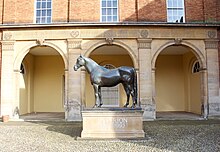Jockey Club

The Jockey Club Rooms in Newmarket, UK
|
|
| Private incorporated by Royal Charter | |
| Industry | Horse racing, Leisure |
| Founded | 1750 |
| Headquarters | 75 High Holborn, London |
|
Area served
|
United Kingdom |
| Revenue | £150.3m (2012) |
|
Number of employees
|
circa 500 FTE |
| Divisions | Jockey Club Racecourses, Jockey Club Estates, The National Stud, Racing Welfare |
| Website | www |
The Jockey Club is the largest commercial organisation in British horseracing, however as it is governed by Royal Charter, all profits it makes are reinvested back into the sport. No longer responsible for the governance and regulation of British horseracing, today it owns 15 of Britain's famous racecourses, including Aintree, Cheltenham, Epsom Downs and both the Rowley Mile and July Course in Newmarket, amongst other concerns such as the National Stud, and the property and land management company, Jockey Club Estates. The registered charity Racing Welfare is also a company limited by guarantee with the Jockey Club being the sole member.
Formerly the regulator for the sport, the Jockey Club's responsibilities were transferred to the Horseracing Regulatory Authority (now the British Horseracing Authority) in 2006.
The Jockey Club has long been thought to have been founded in 1750 - a year recognised by the club themselves from their own historic records. Some claim it was created earlier, in the 1720s, while others suggest it may have existed in the first decade of the century.
It was founded as one of the most exclusive high society social clubs in the United Kingdom, sharing some of the functions of a gentleman's club such as high-level socialising. It was called 'The Jockey Club' in reference to the late medieval word for 'horsemen', prounced 'yachey' and spelt 'Eachaidhe' in Gaelic. The club's first meetings were held at the Star & Garter Pub at Pall Mall, London before later moving to Newmarket; a town known in the United Kingdom as "The Home of Racing". It was historically the dominant organisation in British horseracing, and it remained responsible for its day-to-day regulation until April 2006.
In the late 19th and early 20th centuries, The Jockey Club had a clubhouse in Pall Mall, where many other gentlemen's clubs were based. The fact that it acquired a governing role in the sport reflected the dominant role of the aristocracy in British horse racing up to the 20th century, and the removal of this role was in part a conscious effect to move the sport away from its patrician image. This can be compared with the way that cricket's Marylebone Cricket Club became the governing body of cricket by default, but later surrendered most of its powers to more representative bodies.
...
Wikipedia
